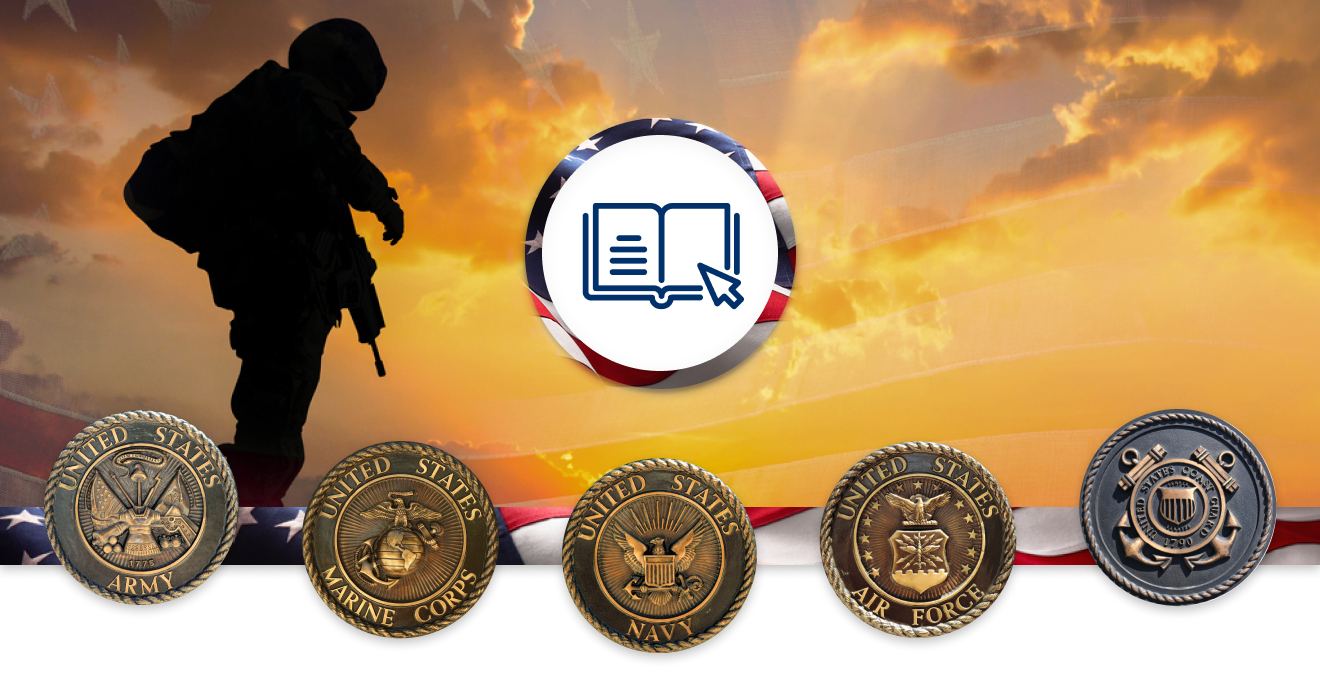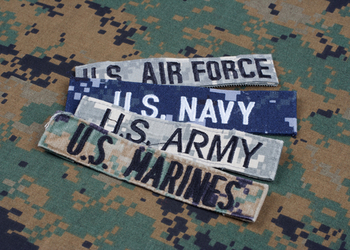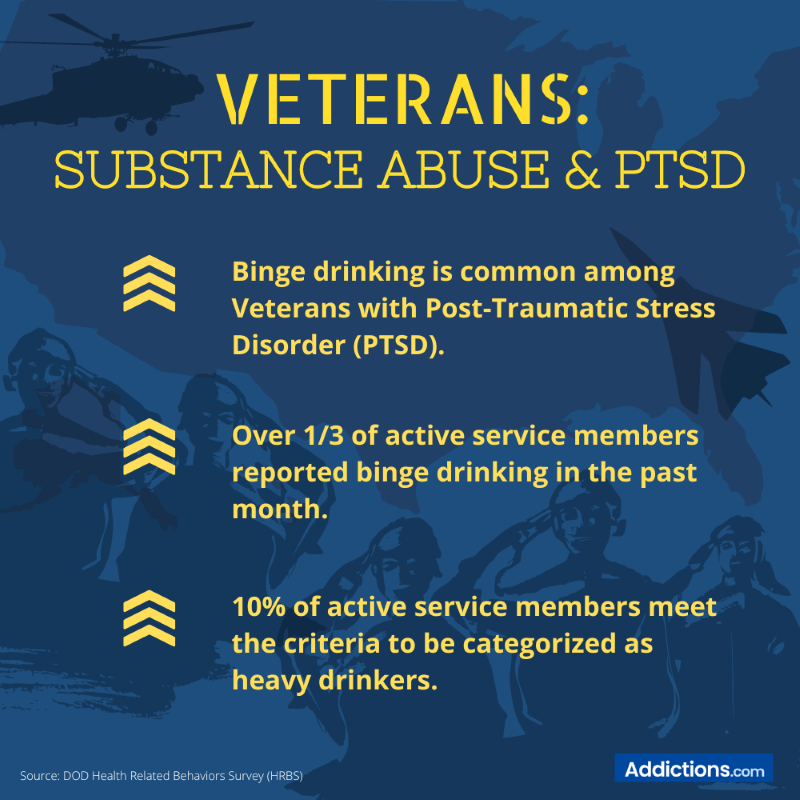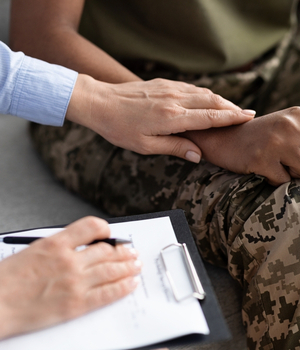Reading Time: 8 minutes

30 Veteran and Military Addiction & Mental Health Support Resources
In the process of defending our nation’s liberty, many service members experience extreme stress and trauma. When those emotional stressors are combined with the unique pressures Veterans face, coping can become extremely difficult. Drug and alcohol abuse is a concern among veterans – particularly abuse of alcohol and opioids. Thankfully, supportive resources for addiction and mental health are readily available to help members of this community thrive in recovery.
Veteran Addiction Statistics
More than 10% of U.S. Veterans have been diagnosed with a substance use disorder (SUD). And while that may seem like a small percentage, it’s important to take into consideration that we currently have 17.4 million Veterans in the U.S. After doing the math, the totality of the problem comes into focus: more than 1.7 million military Veterans are currently struggling with substance abuse.

But that’s not the only concerning statistic…
Additional research reveals that over 40% of U.S. Veterans will suffer from alcohol use disorder at some point in their lives. Data also shows that alcohol and prescription drug abuse are more prevalent among members of the armed forces than the rest of society – and those numbers are climbing. For example, 10% of military members misuse prescription medication, compared to just 1.8% of the general population.
The U.S. Department of Veterans Affairs reports:
soldiers returning from the wars in Iraq and Afghanistan abused drugs or alcohol.
of Veterans seeking treatment for a substance use disorder also have PTSD.
of Veterans who served in Iraq or Afghanistan suffer from either major depression or PTSD.
Why Veterans Need Addiction and Mental Health Support
Veterans face unique challenges that can lead many of them to seek solace in substance abuse. What’s more, the environments they are exposed to tend to increase the risk of both mental health issues and substance use disorder.
Common causes of substance abuse and mental illness among Veterans include:

- PTSD: Among Veterans, there is a high incidence of post-traumatic stress disorder. These individuals must endure hardships and stressful events. The resulting PTSD can be difficult to cope with, and Veterans may turn to substances to numb the pain.
- Stress: Even those who aren’t diagnosed with PTSD may experience a high level of mental stress during their time of service. As a result, Veterans tend to experience more mental health issues such as anxiety and depression. Some turn to substances to self-medicate.
- Combat: Exposure to combat often causes injury and trauma. These increase the risk of mental health disorders as well as substance use disorders.
- Traumatic brain injury: These injuries cause impairments in cognition, which have been shown to increase the risk of substance abuse.
- Chronic pain: Often, painkillers are prescribed to Veterans to manage injuries. This can lead to prescription drug dependence and abuse.
- Transition: Making the transition from military to civilian life can be difficult. The stress involved can lead Veterans to abuse substances.
- Stigma: Some Veterans may feel stigmatized if they seek help with mental health issues or substance use issues. Because they do not get treatment, their problems worsen.
Addiction and Mental Health Resources for Veterans
It is crucial that Veterans receive the addiction and mental health resources needed. According to data, more than 40% of individuals with a substance use disorder also struggle with a mental health condition. However, less than half of those people receive treatment for either.
Fortunately, support is available for Veterans. Following are 30 of the supportive resources that Veterans and their families can tap into to receive assistance, encouragement, guidance, and treatment.
Military Veterans Organizations & Foundations
 Coming Home Project: This non-profit is devoted to providing care, support, and stress management tools for Iraq and Afghanistan veterans and their families. Free services include counseling, education, training, retreats, and more.
Coming Home Project: This non-profit is devoted to providing care, support, and stress management tools for Iraq and Afghanistan veterans and their families. Free services include counseling, education, training, retreats, and more.- Grace After Fire: This organization serves women veterans from all branches and eras. Their site offers links to treatment options and other resources, with the mission of helping women Veterans by connecting them with resources and tools to be productive citizens after transitioning from the military.
- Hope for the Warriors Care Management Services: This organization provides support programs for service members, veterans, and military families. The resources focus on health and wellness, peer engagement, and connecting to other community support networks.
- Mental Health – U.S. Department of Veterans Affairs: This VA site offers mental health support and information. The VA provides a variety of support for mental health challenges. This site includes treatment resources and information.
- National Alliance on Mental Illness: This organization offers information, education, and support for veterans, service members, and their families. The site provides resources on mental health related illnesses and treatment.
- National Center for PTSD: This is the world’s leading educational and research center of excellence on PTSD and traumatic stress. It offers information and treatment options for Veterans who have experienced PTSD.
- National Institute of Mental Health: This institute is the leading federal agency for research on mental health disorders. The site offers information on mental health topics and links to find treatment.
- Real Warriors: An effort put forth by the Military Health System, promoting support for the psychological health of military personnel. It encourages the military community to reach out for help with depression, anxiety, and PTSD. It also links veterans and their families with care and provides free resources.
- Red Cross: This organization offers services to veterans by connecting them with resources throughout the country and on military installations around the globe. Links on the site include referral services to help veterans find counseling and other social services providers.
- Substance Abuse and Mental Health Administration: SAMHSA is an agency within the U.S. Department of Health and Human Services. The organization’s mission is to reduce the impact of substance abuse and mental illness in America. The site offers links to mental health resources.
- TriCare: The is the health care program for uniformed service members, retirees, and their families. Their mission is to enhance the Department of Defense by providing health support for military personnel.

Military Veterans Online Resources
- Anger and Irritability Management: An online video course based on the work of Dr. Patrick Reilly, Ph.D., Clinical Psychologist. Provides skills and tools to manage anger.
- Cigna Stress Management Toolkit: This site offers interactive tools to measure stress and learn how to cope with it. It offers links to podcasts on exercises that help relieve stress.
- Community Provider Toolkit: This site is a go-to source for health care professionals who work with Veterans. It provides information and tools related to Veterans’ mental health.
- Help For Our Heroes: This program offers treatment for veterans and first responders who are struggling with trauma, PTSD, addiction, depression, and co-occurring disorders. Treatment is designed specifically for this population, to help them cope with the problems associated with job stress and chemical dependency. The goal is to help veterans and first responders overcome the issues that lead to addiction.
- Make the Connection: Watch videos, read stories, and listen to podcasts of Veterans and their loved ones sharing their experiences, struggles, and recovery. Search 800+ videos by service era, branch, gender, and combat experience to find relatable stories.
- Operation Mend: This program offers comprehensive psychological healthcare for post-9/11-era service members, veterans, and their families. The treatment is provided at no cost.
- Operation Reach Out: Free suicide prevention app provided by Military Community Awareness, designed to prevent suicide among military personnel and veterans. Developed by a team of suicide prevention experts and designed to encourage people to reach out for help and stay connected with others.
- Suicide Prevention Action Network: This suicide prevention site offers information and resources for veterans and their families. The site includes multiple resources for those who may be at risk for suicide.
- VA Mental Health Services for Veterans and Families: This handbook shares what mental health services are available through local and regional VA health care facilities. Offers information for Veterans, Veteran family members, and members of Veterans service organizations.
SAMHSA statistics on substance abuse among military Veterans show:
* More than 80% (nearly 900,000) abuse alcohol
* Nearly 27% (about 300,000) abuse illegal drugs
* About 7% (almost 80,000) abuse both alcohol and illegal drugs
Military Veterans Treatment Directories
 Homecoming 4 Veterans: This site offers information about treatment for Veterans suffering from PTSD. It links to a network of clinicians who offer free neurofeedback treatment options. These methods can help people who are recovering from substance abuse and others find peace from PTSD.
Homecoming 4 Veterans: This site offers information about treatment for Veterans suffering from PTSD. It links to a network of clinicians who offer free neurofeedback treatment options. These methods can help people who are recovering from substance abuse and others find peace from PTSD.- Give an Hour: This site connects Veterans with local mental health clinics for a free counseling session. Search the directory to find a health provider to help with substance abuse, PTSD, anxiety, depression, and other mental health concerns.
- Vet Centers: These are community-based counseling centers that offer services for Veterans and their families. The counseling is designed to help veterans successfully transition to civilian life after a traumatic experience in the military. Referrals are provided to additional VA services.
- Veterans Alcohol and Drug Dependence Rehabilitation Program: This program offers medical, social, vocational, and rehabilitation services to alcohol and drug dependent Veterans. Treatment options include rehab, detox, and psychiatric care.
- Warriors Heart: This center offers private treatment for veterans and active military who seek treatment for alcohol abuse, chemical dependency, and co-occurring psychological disorders associated with PTSD.
- Zoc Doc: This site allows veterans to search for therapists and counselors in their area. Find treatment providers who take specific insurance carriers and plans.
Military Veterans Suicide Prevention and Crisis Lines
- Homelessness Hotline: 877-424-3838. A crisis line for veterans who are currently experiencing homelessness or at risk of homelessness. Family members and supporters of veterans at risk can also call.
- Lifeline for Vets: Call 888-777-4443. Provided by the National Veterans Foundation. Offers crisis management and support for veterans in need.
- Suicide Prevention Lifeline: This site offers main crisis line info (800-273-8255) and additional resources for veterans and service members in crisis.
- Veterans Crisis Line: 800-273-8255 – Call for confidential crisis support. For Veterans and their loved ones. Available 24/7.
If you or someone you love is experiencing a substance use disorder, help is available. Treatment specialists are available to assist you in finding a rehab center that specializes in caring for military veterans.




